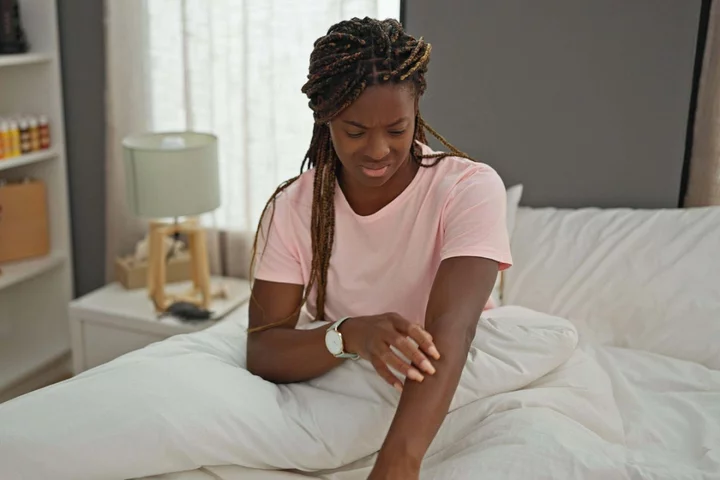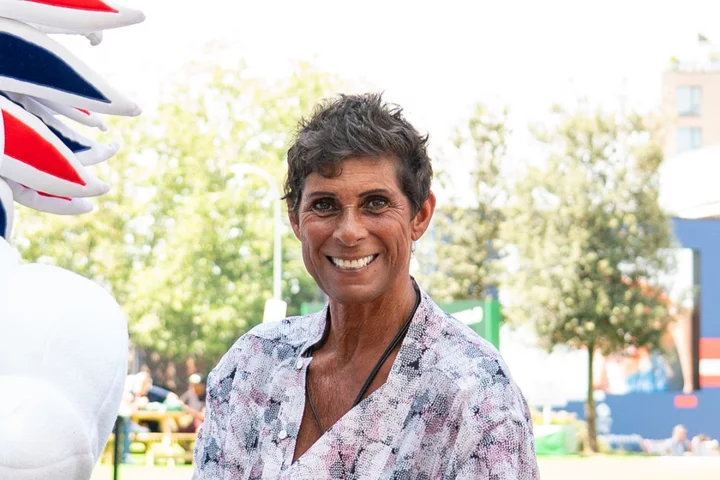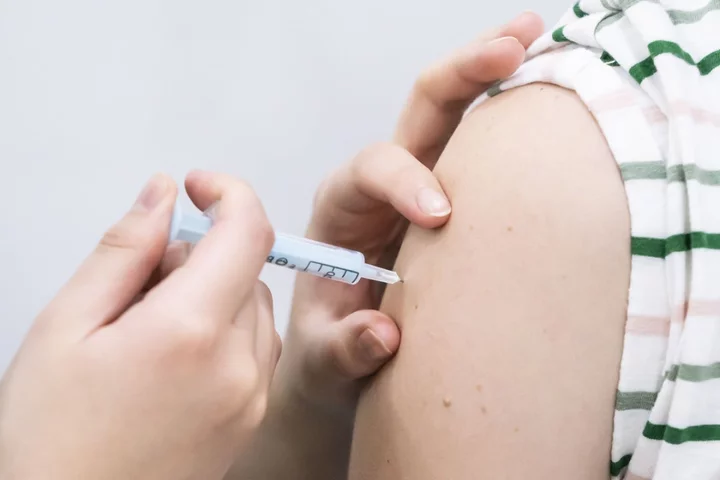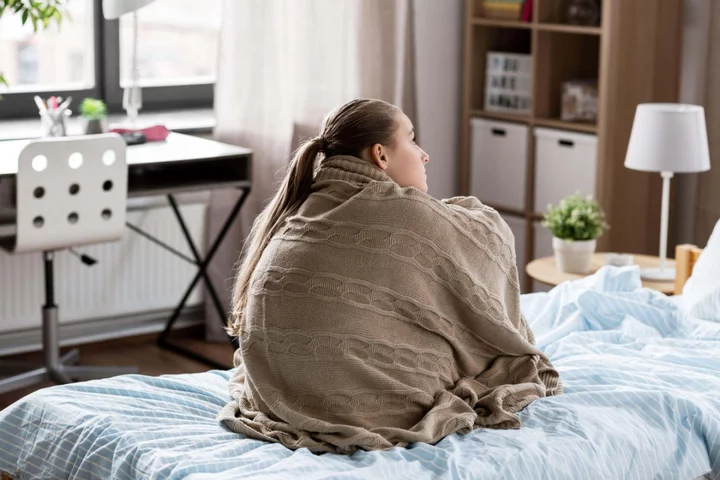
Mantle Piece: You Can Own Shares of Mickey Mantle’s Boyhood Home for $7
The baseball icon’s modest Oklahoma home is getting the fractional ownership treatment.
2023-10-27 03:20

One Minute of Music: Remembering the HitClips Fad of the Early 2000s
The tiny chips held just 60 seconds of pop music, but kids still couldn’t get enough.
2023-10-27 01:25

TikTok influencers warn about ‘potent’ steroid cream risks among black women – dermatologist explains the risks
According to skin influencers on TikTok, topical steroid creams are being ‘illegally sold’ in some black Afro hair and beauty supply stores, affecting black women in particular. Angela Mavalla, a pharmacist and skincare educator, has been sharing TikTok videos garnering thousands of views, encouraging black women to stop purchasing topical steroid creams from these shops – as they are meant to be prescription-only treatments used with appropriate guidance from a doctor. When used incorrectly, the creams can make potentially make skin symptoms worse and harder to manage. “Though these creams tend to address issues like acne and eczema very quickly, because of their potent nature, the skin becomes addicted to it and will flare up badly once you stop using them,” said Mavalla. “A lot my clients – [who are black women] – that I consult privately, were coming to me with issues relating to topical steroid use, such as having terrible flare-ups because they had stopped using the cream, and needed help with tapering off them. “I began making content based on these creams, mainly to warn people of them, and found that these TikTok’s would go viral in a short space of time, with lots of people relating to it, and giving their own testimonials of how the creams damaged their skin,” Mavalla added. “I have seen instances of accidental skin bleaching, worsened eczema and hyperpigmentation, topical steroidal withdrawal and addiction, and worst of all, a crippling low self-esteem and self image. It’s awful. “The first point of call when it comes to steroidal creams should always be a pharmacy. Pharmacists are always willing to help, advise and where necessary, signpost to the most appropriate medical profession, such as a dermatologist.” Dr Unnati Desai, the national GP lead, as well as safeguarding lead for GP services and dermatology lead at Nuffield Health, acknowledged that it can take sometimes take time to correctly diagnose these conditions, and might require a biopsy. It might also take a longer period of time to get symptoms under control, as skin conditions may require trying multiple different treatment regimes to find the one that suits each individual person, as well as getting to grips with individual triggers. What are topical steroid creams and what should they be used for? Doctors prescribe topical steroid creams to treat a wide range of skin complaints – but it’s important to have proper assessments first. “They are topical medications (synthetic corticosteroids) that have an anti-inflammatory action on the skin, by suppressing the skin immune system and constricting the blood vessels of the skin where applied,” Desai told the PA news agency. “They are used for dermatological conditions that result in inflamed, itchy or irritated skin – e.g. eczema, psoriasis, lichen simplex, lichen planus, lichen sclerosus and other autoimmune dermatoses.” Why do people experience topical steroid withdrawal after using steroid creams? When used incorrectly, topical steroids may have potentially significant side-effects. And as Desai warned: “Stopping any steroid treatment suddenly can often result in a flare-up of the condition, which may be worse than the original presentation.” There are some obvious signs and symptoms to look out for to figure out if you are experiencing topical steroid withdrawal, such as red, burning skin and a lumpy, papulopustular rash. “When using a steroid cream to get a dermatitis flare-up under control, especially when a more potent steroid cream has been used for a prolonged period of time, it is necessary to slowly come off the steroid cream and wean your skin off treatment by either reducing the potency of the cream, or the frequency [of application],” said Desai. “This gives the skin time to adjust to coming off the steroid cream slowly, but also clarifies whether the skin condition is coming under control with treatment. “Sometimes, severe dermatoses require long-term use of a medication to be controlled, in which case your doctor will consider alternative treatment modalities.” What damage can it do to your skin?Desai added: “Long-term use of potent steroid creams is not recommended, as there may be some systemic absorption, which can result in suppression of your body’s natural cortisol hormone at the worst. “In most cases, it is the long-term impact on the skin itself that is the concern, as regular or long-term use of steroid creams can impact the skin integrity and thickness, resulting in thinning of the skin, stretch marks, increased hair at the site of use, enlarged skin blood vessels and bruising. “Using a steroid cream when there is an underlying infection present on the skin will make the infection worse, or using steroid creams on the face can result in other chronic skin conditions, such as perioral dermatitis or other acneiform eruptions. “Occasionally, an allergy can develop to components within the cream that can make the dermatitis worse.” How can people remain safe? Desai stressed the importance of only using topical steroid treatments under the appropriate supervision of a qualified clinician. “In addition, as most chronic inflammatory skin conditions tend to result in drier skin, self-care at home with soap substitutes and emollients is important,” she said. “This includes gently cleansing the skin one to two times daily maximum (over-washing will negatively impact the skin barrier function, as will long hot bubble baths), and using unscented emollients (medical grade skin creams designed to gently hydrate the skin), which will better protect the skin and may, depending on the skin condition, make a flare-up less frequent or less severe. “If a steroid cream is needed, a doctor will recommend the amount of cream to be used according to the size of the area affected. We use the ‘Finger Tip Unit’ (FTU) – one FTU is the amount of topical steroid that is squeezed out from a standard tube along an adult’s fingertip – as a method of advising each patient how much cream they need to use with each application.” Read More House of the Year 2023 shortlist revealed by Royal Institute of British Architects Fatima Whitbread supporting new fostering campaign, as research finds ‘misconceptions put people off’ 5 key coat trends to complete your autumn/winter wardrobe 12 ways to weave some woodland wonder into your home Hibernation mode: 5 small self-care adjustments to make before the clocks change 13 possible cancer symptoms you should get checked out
2023-10-26 19:47

Fatima Whitbread supporting new fostering campaign, as research finds ‘misconceptions put people off’
Misconceptions including being single or too old are said to be putting people off fostering at a time of dire need for more carers, as Olympian Fatima Whitbread and poet Lemn Sissay front a new recruitment campaign. Radio presenter Pandora Christie has also joined efforts to get more people to consider fostering, as the trio – who all had experience living in care as children – shared photographs of their younger selves in support of the campaign. The National Fostering Group (NFG), which describes itself as the largest network of independent fostering agencies in the UK, said its research had shown thousands of carers are needed across Great Britain. Sissay, who has previously detailed his experiences in the British care system, said fostering or adoption is “the greatest thing a human being can do for another”, while Whitbread, who grew up in children’s homes, said it is “a unique chance to make a real difference to a child’s life”. The NFG described the care system as being “at a critical point” and said information it had received from 128 local authority fostering agencies in England, Scotland and Wales suggested almost two thirds of those had seen a rise in young people going into care in the last 12 months and an estimated 10,500 foster carers are now “urgently needed across the country”. But its polling of 2,000 adults suggested less than a fifth (14%)of people would consider fostering – a figure the NFG said could be higher if certain misconceptions were not held. More than a third (34%) of people felt they were too old to foster – with most of those who said this in the 65-plus age bracket, but 18% aged between 55 and 64 and 11% aged 45 to 54, the NFG said. Other reasons included already having their own children (13%), being single (13%), working (11%) and being disabled (9%), it added. Steve Christie, chief executive of the NFG said: “Many people perceive there to be barriers to becoming a foster carer that simply aren’t true. “We will consider people regardless of age, marital status, gender, sexuality, disability or employment status. “Anyone who has room in their home and their heart could be a foster carer, and most of our foster carers say that fostering is the best thing they have ever done.” Backing the campaign, Olympic javelin champion Whitbread said: “Foster carers offer children and young people a safe, loving and nurturing home when they can’t live with their birth families. This means they have a unique chance to make a real difference to a child’s life.” Heart radio presenter Christie, who went into foster care aged nine, said: “Foster parents are fundamental in creating a safe home environment and support system for children and young people who find themselves needing care. “The amount of futures they help to change and the difference foster parents can make to a child’s life is indescribable.” Sissay, who wrote about his time in care in his autobiography, My Name Is Why, said: “A child will test you emotionally, spiritually, financially, throughout your life, so to foster or adopt a child is the greatest thing a human being can do for another.” For more information on fostering, visit www.nfa.co.uk. Read More 5 key coat trends to complete your autumn/winter wardrobe 12 ways to weave some woodland wonder into your home Hibernation mode: 5 small self-care adjustments to make before the clocks change 13 possible cancer symptoms you should get checked out Neglecting women’s health at work could cost UK economy £20.2bn a year – analysis Nearly three-quarters of mothers feel invisible, study suggests
2023-10-26 16:49

First ever Florida Man games will feature beer belly wrestling and 'evading arrest' obstacle course
It ain’t the Olympics, but a group of Floridians plan to host competitions themed according to the collective antics of the beer-loving, gator-possessing, rap-sheet heavy, mullet-wearing social media phenomenon known as “Florida Man.”
2023-10-26 16:25

Shingles symptoms, what causes it and how to treat the virus
Shingles can be a very painful experience that affects around one in four adults in their lifetime. The infection, also known as herpes zoster, is caused by the varicella-zoster virus which also causes chickenpox. The virus is extremely common, with more than 90 per cent of the world’s population having it. It is usually contracted when people get chickenpox as children, but the virus does not go away, instead, it will lay dormant in the body’s nervous system for years. For about a third of people who get the virus, it will reactivate some years later and cause shingles. Here is everything you need to know about the symptoms of shingles and how to treat it: What are the symptoms? A person who gets shingles will experience a painful rash that can occur anywhere on the body. Early signs of shingles could be a tingling or painful feeling in an area of skin, a headache or feeling generally unwell. According to the NHS, the rash usually looks like “a single stripe of blisters that wraps around the left side or right side of your torso”. They appear as blotches on the skin that become itchy blisters, which can break and ooze fluid. The rash can be red, but this can be harder to see on brown or black skin. The rash can also appear on your face, eyes and genitals. If it appears around your eyes, it can affect your sight or hearing and make it hard to move one side of your face. According to the Mayo Clinic, if left untreated, the infection can lead to permanent eye damage. After a few days, the blisters will dry out and become scabs. If a rash appears on both the left and right side of the body, it is unlikely to be shingles. How is it treated? Shingles can take up to four weeks to heal, but can have more severe consequences in older people above the age of 50. If the symptoms are not serious, patients can take paracetamol to ease the pain and use a cool compress on the rash several times a day to soothe it. It is also recommended that you keep the area with the rash clean and dry to reduce the risk of infection and wear loose-fitting clothing. But there are some situations in which it is recommended you contact your GP or call 111. Due to the heightened risk in older people, you should seek help if you are aged 50 or older. People with a weakened immune system should also contact the health service, as well as those who have a rash that is widespread and painful, or has appeared near an eye. Are shingles contagious? Shingles are not contagious and you cannot spread them. However, if you come into contact with someone who has not had chickenpox and has not been vaccinated against chickenpox, they could catch chickenpox from you. The NHS recommends you avoid being around pregnant people who have not had chickenpox before, people with a weakened immune system, and babies that are less than a month old. Is there a vaccine against shingles? Yes, but it is only available on the NHS to people in their 70s. Shingles can be fatal for around one in 1,000 over-70s who develop it. The vaccine injection only needs to be given once. However, some people who cannot have the routine vaccine for health reasons will need two doses. Getting the vaccine will reduce your risk of getting shingles, and if you do get it, your symptoms may be milder and the illness shorter. If you already had shingles, you can still get the vaccine to protect yourself against developing it again. You may have to wait up to one year after you have recovered from the illness before you can get the vaccine. Read More When do the clocks go back in the UK this year? Hibernation mode: 5 small self-care adjustments to make before the clocks change Want to be a useful man? Arnold Schwarzenegger is here to tell you how When do the clocks go back in the UK this year? Hibernation mode: 5 small self-care adjustments to make before the clocks change Want to be a useful man? Arnold Schwarzenegger is here to tell you how
2023-10-26 15:54

Shingles explained as Holly Willoughby takes time off from This Morning
Holly Willoughby has announced that she “may not” be c-hosting ITV’s This Morning in the coming week due to contracting shingles. The 42-year-old TV presenter wrote on her Instagram Story on Sunday (16 April): “Hi, just to let you know, I may be away for the rest of the week as I have shingles.” “I’ll be back as soon as I’m better. Huge love,” she added. Shingles can be a very painful experience that affects around one in four adults in their lifetime. The infection, also known as herpes zoster, is caused by the varicella-zoster virus which also causes chickenpox. The virus is extremely common, with more than 90 per cent of the world’s population having it. It is usually contracted when people get chickenpox as children, but the virus does not go away, instead, it will lay dormant in the body’s nervous system for years. For about a third of people who get the virus, it will reactivate some years later and cause shingles. Here is everything you need to know about the symptoms of shingles and how to treat it: What are the symptoms? A person who gets shingles will experience a painful rash that can occur anywhere on the body. Early signs of shingles could be a tingling or painful feeling in an area of skin, a headache or feeling generally unwell. According to the NHS, the rash usually looks like “a single stripe of blisters that wraps around the left side or right side of your torso”. They appear as blotches on the skin that become itchy blisters, which can break and ooze fluid. The rash can be red, but this can be harder to see on brown or black skin. The rash can also appear on your face, eyes and genitals. If it appears around your eyes, it can affect your sight or hearing and make it hard to move one side of your face. According to the Mayo Clinic, if left untreated, the infection can lead to permanent eye damage. After a few days, the blisters will dry out and become scabs. If a rash appears on both the left and right side of the body, it is unlikely to be shingles. How is it treated? Shingles can take up to four weeks to heal, but can have more severe consequences in older people above the age of 50. If the symptoms are not serious, patients can take paracetamol to ease the pain and use a cool compress on the rash several times a day to soothe it. It is also recommended that you keep the area with the rash clean and dry to reduce the risk of infection and wear loose-fitting clothing. But there are some situations in which it is recommended you contact your GP or call 111. Due to the heightened risk in older people, you should seek help if you are aged 50 or older. People with a weakened immune system should also contact the health service, as well as those who have a rash that is widespread and painful, or has appeared near an eye. Are shingles contagious? Shingles are not contagious and you cannot spread them. However, if you come into contact with someone who has not had chickenpox and has not been vaccinated against chickenpox, they could catch chickenpox from you. The NHS recommends you avoid being around pregnant people who have not had chickenpox before, people with a weakened immune system, and babies that are less than a month old. Is there a vaccine against shingles? Yes, but it is only available on the NHS to people in their 70s. Shingles can be fatal for around one in 1,000 over-70s who develop it. The vaccine injection only needs to be given once. However, some people who cannot have the routine vaccine for health reasons will need two doses. Getting the vaccine will reduce your risk of getting shingles, and if you do get it, your symptoms may be milder and the illness shorter. If you already had shingles, you can still get the vaccine to protect yourself against developing it again. You may have to wait up to one year after you have recovered from the illness before you can get the vaccine. Read More Five signs of sepsis you need to know and act on immediately EuroMillions winner burned through £40m by spending £100K a week Tech entrepreneur, 45, spends $2m a year on reverse ageing to achieve body of an 18 year old: ‘Horrifying’ Shingles symptoms, what causes it and how to treat the virus When do the clocks go back in the UK this year? Hibernation mode: 5 small self-care adjustments to make before the clocks change
2023-10-26 15:53

Hibernation mode: 5 small self-care adjustments to make before the clocks change
With the clocks going back on October 29, longer, darker nights are imminent – and many of us may be nervous about how this could impact our wellbeing. But, there are some little acts of self-care that could help. Here’s how to switch up your self-care routine as the clocks change… 1. Spend more time outdoorsIt may be getting colder, but time outside could be the best thing for you to protect your emotional welfare as the shorter days draw in. “When the clocks change, the internal body clock, our circadian rhythm, has to reset and it can become out of sync with our standard night-and-day cycle. It can take a few days for our body to adjust to the new sleep pattern, which can affect our hormones and temperature,” explains Dr Harriet Leyland, clinical advisor at myGP. To mitigate this, “spend more time outdoors”, she suggests. “Sunlight can alleviate drowsiness as it limits the release of melatonin, a hormone that induces tiredness and gets you ready for bed.” Jodie Relf, a Pilates instructor and registered dietitian from myOva, suggests making this part of your daytime routine. “[Getting outside] can be more challenging once the clocks have changed, it’s often dark for many of us both going to and returning from work. Therefore trying to get outside during the day, at lunchtime, perhaps, can be beneficial in the winter months,” says Relf. 2. Think about your body temperatureYou may be feeling the cold outside, but we don’t want to overheat indoors – especially at bedtime. “We sleep better in a cooler environment, with the ideal bedroom temperature reported to be a cool 16-17C,” says Dr Guy Meadows, co-founder and clinical lead at Sleep School. “For best sleep, switch off the central heating and swap your lightweight summer duvet for a higher tog winter one. Alternatively, use a combination of sheets, quilts and blankets, as this allows you to more easily regulate your temperature at night for better sleep.” 3. Prepare for good sleepIf you always struggle with sleep when the clocks change, give yourself a helping hand by being prepared. “Gradually adjust your bedtime in the few days leading up to the clocks changing – go to bed 15-30 minutes earlier each night for a few nights in the lead-up,” suggests Meadows, explaining this will help with the body-clock switch. 4. Eat a colourful plate While you may just want stodgy comfort food to warm the chillier evenings, eating well is one of the best ways to support your overall wellbeing – aiding energy, immunity, mood and sleep. “Eat a balanced diet with a colourful variety of plant foods including fruits, vegetables and whole grains, as well as lean protein,” explains Dana Moinian, a psychotherapist at The Soke. “Avoid heavy or high-sugar meals close to bedtime.” 5. See friends While social plans may have wound down compared with summer, hibernating and distancing yourself too much could be damaging to your wellbeing. “Spend time with friends and loved ones,” says Moinian. “Socialising naturally boosts your mood and reduces stress levels.” So get the diary out and plan in some fun outings and get-togethers! Read More 13 possible cancer symptoms you should get checked out Neglecting women’s health at work could cost UK economy £20.2bn a year – analysis Nearly three-quarters of mothers feel invisible, study suggests The best ways to work-out in 22 minutes – as study finds this is magic number for offsetting ‘negative impact of sitting’ What crops will we be growing in the future, as climate change alters the landscape? As Rebecca Adlington shares heart-breaking miscarriage news: How to support others experiencing baby loss
2023-10-26 14:22

McDonald’s Boo Buckets Are Back—and Here’s How to Get Them
Boo Buckets are back for 2023, and here’s how you can get your hands on the McDonald’s Halloween buckets that kids have been getting hyped up for since the 1980s.
2023-10-26 05:51

Kylie Jenner says she and ex Travis Scott are doing ‘the best job that they can do’ as co-parents
Kylie Jenner has shared a rare comment about co-parenting with her ex, Travis Scott. The 26-year-old model spoke candidly about her and Scott’s children – Stormi, five, and Aire, one – during an interview with The Wall Street Journal Magazine, published on 24 October. When asked about co-parenting with the rapper, she said: “It’s going…. I think we’re doing the best job that we can do.” Scott and Jenner first started dating in 2017 and had an off-and-on relationship until January 2023. At the time, a source claimed to Us Weekly that the pair were “off again,” after rekindling their romance for a second time in February 2020. However, the publication also claimed that the former couple was still on good terms, adding: “This has happened so many times before, they’re known to be on-again, off-again, but always remain friends and great co-parents.” Since their split, Scott has shown his support for his ex. In April, he took to the comments of one of her Instagram posts and wrote: “A beauty.” However, fans came up with a different theory in July, with claims that a reference in his song, MELTDOWN”, was about Jenner’s new relationship with Timothée Chalamet, who she’s been romantically linked to since May 2023. At the end of the song’s second verse, Scott raps the lines: “Chocolate AP and chocolate the Vs got the/ Willy Wonka factory (Vs)/ Burn a athlete like it’s calories find another flame/ hot as me, b****.” The mention of Willy Wonka is seemingly in reference to Chalamet’s leading role as Roald Dahl’s famous fictional chocolatier in the forthcoming musical feature film, Wonka. During her interview with WSJ Magazine, the reality star also spoke candidly about motherhood, and how her perspective on beauty standards has changed while raising Stormi. She also described some of the lessons she’s teaching her daughter. “My daughter has totally taught me a lot more about myself, and seeing myself in her has changed everything. I’ve had so much growth and am just embracing natural beauty,” she said. “I’m teaching her about mistakes that I made and making sure she knows she’s just perfect exactly how she is.” The Kardashians star specified that some mistakes she’s made over the years have included getting “surgery when [she] was younger”. She added that while she’s never gotten work done on her face, she still decided to have a breast augmentation, which she’s previously been open about. “But just even getting my breasts done when I was 19 and getting pregnant soon after, not obviously planning to be pregnant at 19,” she said. “And I was never insecure about myself. I actually was always super confident and loved my body. I was just having fun. I was influenced by amazing boobs and was like, that’s what I wanted to do, and had fun with it.” According to the Kylie Beauty founder, her experiences can be lessons for her children. “I probably just should have waited until I maybe had kids or let my body just develop,” she said about the procedure, before adding that motherhood is about “teaching our kids to do better than us, be better versions of who we were”. During the interview, she also spoke about legally changing her son’s name from Wolf Jacques to Aire in 2023, one year after he was born. “That was the hardest thing that I’ve ever done in my life,” she said. “I’m still like: ‘Did I make the right decision?’” She also explained how difficult it was for her to come up with her son’s name shortly after giving birth. “The postpartum hit, and the hormones, and I couldn’t even make a decision or think straight,” she added. “And it just destroyed me. I could not name him. And I was like: ‘I feel like a failure. I don’t have a name for my son.’ So it took me a while. And then the longer I waited, the harder it was to name him.” Read More Timothée Chalamet compares Kylie Jenner romance to Harry-Meghan South Park episode Gym maths: How to optimise 22 minutes exercise a day according to fitness experts Chris Pratt sparks relatable parenting debate about childhood trophies Gym maths: How to optimise 22 minutes exercise a day according to fitness experts Chris Pratt sparks relatable parenting debate about childhood trophies Jasmine Harman tearfully recalls mother’s struggles with hoarding
2023-10-26 04:47

Scholastic will drop policy that makes it easier for school fairs to exclude diverse books
Scholastic Inc. will end a widely criticized policy that made it easier for school book fairs not to sell works with racial, disability and LGBTQ+ themes
2023-10-26 03:56

Wild Misconceptions About Sharks
In this episode of Misconceptions, host Justin Dodd debunks some myths about these great beasts of the ocean, from whether punching them in the nose is a valid defense tactic to the events that inspired 'Jaws.'
2023-10-26 03:50
